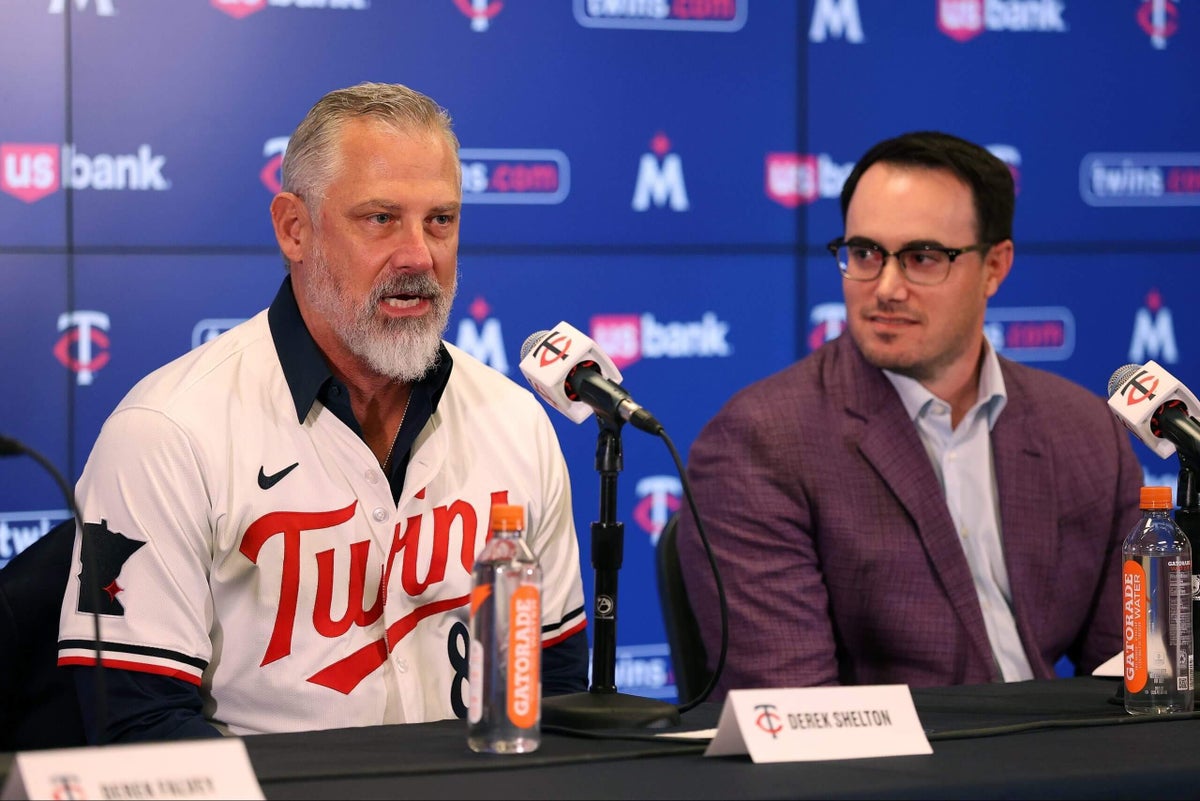MINNEAPOLIS — At first, Derek Shelton was bitter and angry about his early-May ouster from the Pittsburgh Pirates after five-plus seasons as the team’s manager.
After he spent a few weeks stewing, he looked inward.
Over the next four months, Shelton — introduced as the 15th manager in Minnesota Twins history on Tuesday afternoon — tried to determine what went right and wrong in Pittsburgh. Whether it was speaking to former Pirates staff members or trusted friends from a lifetime in baseball, Shelton looked hard at how he operated in case another managing opportunity arose.
On Tuesday, Shelton and Twins president of baseball operations Derek Falvey cited Shelton’s introspective period as a critical reason the club landed on its former bench coach to be the new manager.
“You start talking to people you trust about what went well and, more importantly, what you should do differently,” Shelton said. “After you do that, you take a ton of notes, and then you start to reflect. I honestly believe the reflection period is probably the reason that I’m in this chair right now. … It gave me a ton of time to reflect on how I can be a better leader moving forward.”
Speaking to an audience loaded with team Hall of Famers Tom Kelly, Kent Hrbek, Justin Morneau and Corey Koskie and longtime pitchers LaTroy Hawkins and Glen Perkins, Shelton emphasized his appreciation for an organization where he spent the 2018-19 seasons.
“It really means a ton to me that you’re here. … It is rare,” he said.
Shelton said he planned to focus on fundamentals, a detail-oriented approach and mentioned how much the team’s aggressive style on the bases late in the season stood out.
“There’s no detail that is too small.”
Earlier today, the #MNTwins introduced Derek Shelton as the 15th manager in club history. pic.twitter.com/qSjcNvf9YT
— DanHayesMLB (@DanHayesMLB) November 5, 2025
Shelton isn’t identifying 2026 as a rebuild, despite taking over a group that got a lot greener after 10 Twins were traded in July.
“We’re going to develop young players,” he said, “and I think we have good, young players.”
Without divulging details of a discussion surrounding the team’s direction, Shelton said he received the transparency he desired from Twins executive chair Joe Pohlad.
“I got the answers that made me really want this job.”
Falvey said a series of intense interview sessions with Shelton elicited the answers he wanted to hear from the team’s next manager. Falvey said the process was streamlined because he already knew the candidate well, citing their familiarity working together in Cleveland, when Shelton was the hitting coach, and again in Minnesota. Because they didn’t have to get to know one another, the pair focused on Shelton’s time in Pittsburgh.
“Shelty and I talked about some of the real challenges that he had in Pittsburgh, very specific challenges, whether those were with players or staff or with the front office,” Falvey said. “I was able to actually hit him on some of those things and say, ‘How would you handle that differently? Because I know how you handled it then. I know what you were frustrated by.’”
What Falvey learned is that Shelton spent his first summer at home since the end of his playing career thinking long and hard about how he’d operate if he were given a second chance. Their discussion led Falvey to recall how his longtime mentor, Terry Francona, always spoke about his failed tenure as manager of the Philadelphia Phillies and how it better prepared him to take over in Boston four years later.
“People that spend time reflecting on what they would do differently, I think give themselves a much better chance to learn from that experience,” Falvey said. “He gave very specific examples of things he would have done and would have handled differently, and I think that was a real strength of his in the process.”
Shelton didn’t shy away from questions about the end of his tenure in Pittsburgh. In five-plus seasons, the Pirates lost 100 games twice and never won more than 76 contests. During that period, several talented young players failed to develop. When the team got off to a 12-26 start this season, Shelton, whose teams went 306-440, was fired.
“It was probably the right time,” Shelton said. “The ability to talk to people I was around and get open and honest feedback (helped). And I do think adversity is the greatest teacher we probably can have.”
While acknowledging it initially irked him, Shelton, who spent part of the summer working on MLB Network’s Loud Outs radio show, said he understood why the Pirates decided to move on.
“Probably the most important thing is, you have to have conversations, and then you have to have the follow-up conversations,” Shelton said. “Because what is heard, what is said, and how it’s retained, sometimes loses its place, and because of that, you don’t end up getting the best out of the situation or the player.”
With several players still early in their careers, and more to come, the Twins trust the lessons Shelton learned will benefit them in his second go-round.
“In anything you do, you have life experiences, you move forward,” Shelton said. “When I left here, I thought I was really prepared to manage because I’d been given a lot of responsibility. But you’re never ready until you sit in the chair. You’re never ready until different things come your way. I think those experiences are what help build you moving forward.”

